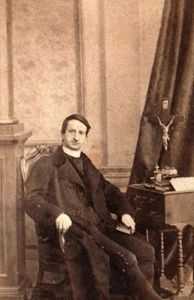Priest, Theologian and Journalist
 Giacomo Margotti was born in Sanremo on 11 May 1823 by Francesco Andrea and Maddalena Vittini.
Giacomo Margotti was born in Sanremo on 11 May 1823 by Francesco Andrea and Maddalena Vittini.
After completing his first studies at the schools of Bussana, he graduated in Philosophical Studies and became a seminarian at Ventimiglia; in 1845 he obtained a doctorate in Theology and Ecclesiastical Law at the University of Genoa with Professor Balbi.
He then moved to Turin to the Royal Academy of Superga where he devoted himself to the study of sacred eloquence, morality, canon law and ecclesiastical history. In 1846 he was ordained a priest.
The social and political situation of that period pushed him to undertake, together with his normal pastoral activity, also a strong action of information and diffusion of Catholic ideas, fighting the Risorgimento secularism that tended to marginalise the Church.
In 1848, together with the Bishop of Ivrea Moreno, Professor Audisio and Marquis Birago, he founded the daily newspaper "L'Armonia" in Turin, of which he was the true soul and brilliant director; so brilliant as to arouse the hard disappointment of the Savoy Turin: without too many compliments he tried to overwhelm it with kidnappings, fines, forced closures and all kinds of harassment (including an attempted murder against his person in 1856), until the definitive closure of the newspaper, ordered by Cavour in 1859.
But the tenacious priest did not give in and managed to win again, first from the columns of "Il Piemonte", then again from the re-established "L'Armonia" which, at the behest of Blessed Pius IX, was renamed "L'Unità Cattolica", on Christmas Day in 1863. Foglio, more moderate, but no less intransigent, which from 1870 to 1929 came out (in Florence) listed in mourning for the condition in which the Pope had come to visit after the end of temporal power.
He was the main author of the motto "neither elected nor voters" (of 1864, later reworked by Blessed Pius IX in the principle of "non expedit"), a natural evolution of the attitude of total closure of the Savoy parliament, which even annulled his triumphant election to the Chamber of Deputies in 1857 in the colleges of Sanremo and Oristano, for the curious crime of "abuse of spiritual weapons", political neologism of the cunning Cavour who certainly did not need an intelligent opposition that was hostile to his anti-clerical line (and extended this aberrant and anti-liberal measure to about twenty newly elected priests).
Of his numerous writings, of which almost nothing comes to our attention but which in any case are enough to trace long shadows of doubt about the work of some pater patriae, it is worth remembering the monumental "Memorie per la storia dei nostri tempi" (in 6 volumes, dated 1863), absolutely unobtainable even in national libraries (and this further lengthens the above-mentioned shadows), then also "Considerazioni sulla separazione dello Stato dalla Chiesa in Piemonte" (1855); "Le vittorie della Chiesa nei primi anni del Pontificato di Pio IX" (1857); "Le consolazioni del S. P. Pio IX" (1863); "Pio IX and his episcopate in the dioceses of Spoleto and Imola" (1877).
He was greatly appreciated by Popes Pius IX and Leo XIII, (the former gave him a golden pen as a symbol of his polemista activity); he had excellent relations with the Jesuits and also promoted the initiative "Obolo di San Pietro" (offerings given to the Roman Church in support of works of charity throughout the world, an initiative still alive today.
He died in Turin on 6th May 1887.
After the solemn funeral that took place in Turin in the church of San Secondo, the body was transported to Sanremo where it was buried in the family tomb of the cemetery of the mouth.
The Municipal Administration dedicated a street to him.
(Taken from Giacomo Razzetti)




